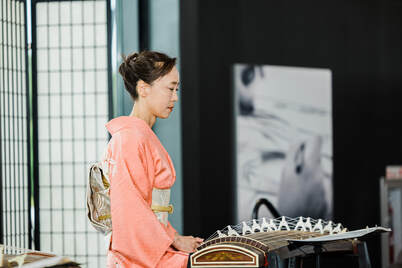|
ABOUT THE KOTO
The koto (箏) is a traditional Japanese harp or a plucked half-tube zither instrument, and the national instrument of Japan. Originated in China, the koto was introduced to Japan during the 8th century. The koto is roughly 180 centimeters (71 in) long, and made from Paulownia wood. The most common type uses 13 strings strung over movable bridges used for tuning, different pieces possibly requiring different tuning. Koto strings are generally plucked using three fingerpicks, worn on the first three fingers of the right hand. The left hand may alter the pitch or sound of each string by pressing or manipulating the strings to the left of the bridges. Various pentatonic tunings are used, depending on the type of music being played. The koto is very versatile and great for any genres of music ~ from traditional Japanese music to classical music, pop, jazz and more. |
Saturday, October 12th, 2024
1 PM performance lasting approximately one and a half hours with a brief intermission. Join us as we welcome back the very talented Shiho Yamashita for a performance of traditional Koto music. Ms. Yamashita will play selections of traditional songs as well as some modern compositions inspired by Studio Ghibli animated films. For two of the selections, she will be accompanied by a fellow musician on the flute. Arching Oaks Art and Culture Center is located at 37114 N. thrill Hill Rd., Eustis, Florida 32736. Look for the Florida Budokan sign at the road and follow the driveway all the way up the hill. Children 16 and under must be accompanied by an adult. ABOUT THE MUSICIAN Shiho has a had passion for playing instruments since she was little, and enjoyed playing different instruments throughout her life. She began playing the koto when she was in college, and performed at concerts throughout her college years. She also has been involved with promoting the traditional Japanese music at various cultural events in Florida where she currently resides. You can also find Shiho at Lake Eola Park in downtown Orlando on occasional weekend mornings, so please stop by and enjoy the sound of the koto. |










